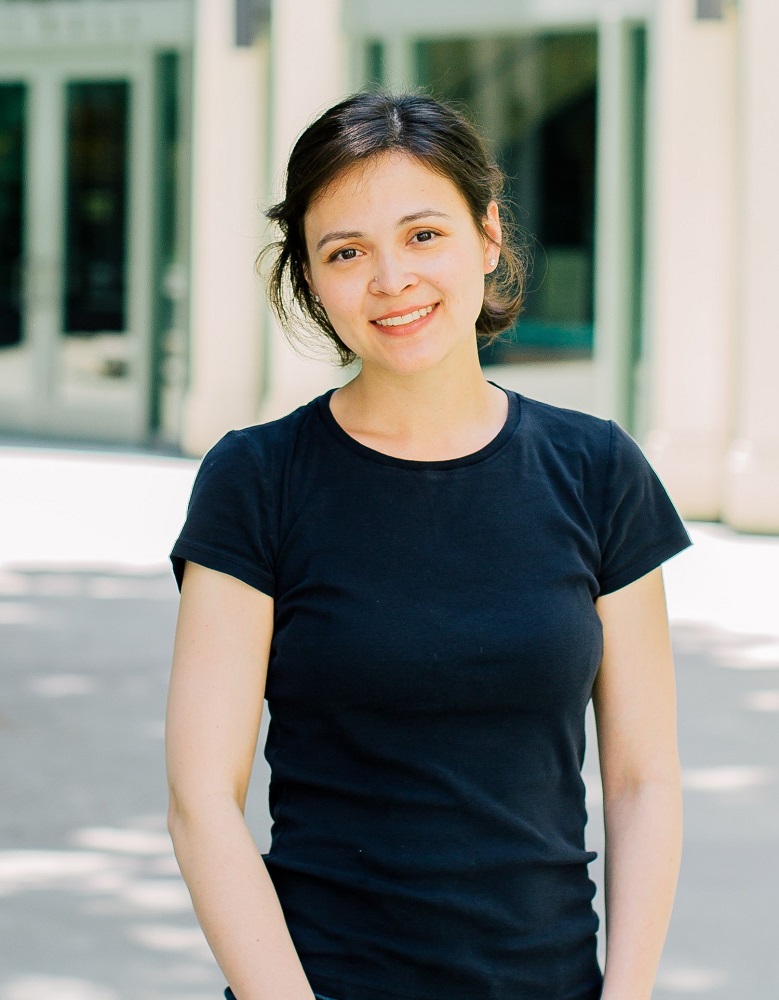I was wondering if after all these months you’d like to read this…
Hello from the other siiiiiiiide
As I sat down to write my first post in months, Adele’s opening lyrics from “Hello” came into my head and I realized the above paraphrased version perfectly captured what I was feeling. This site has always been where I share fun news, but 2020 made it hard for me to write or focus on much besides maintaining sanity and not getting Covid-19.
But now we’re on the other side and I wanted to poke my head back out and say hi! And I have a fun reason to do so.
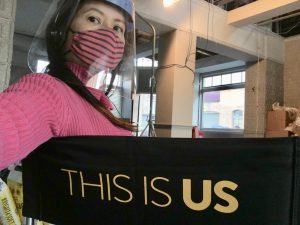
Shielded and masked on set
Toward the end of last year, I had the great pleasure of being a Vietnamese consultant and dialogue coach on several episodes of This Is Us, which featured a storyline involving a mysterious Vietnamese man named Hai and his relationship with Randall’s birth mom, Laurel.
When I first read episode 506, “Birth Mother,” cowritten by Kay Oyegun and Eboni Freeman (Oyegun also directed it), I thought it was the most beautiful TV episode I’d ever read that centered a Vietnamese character. And I couldn’t have been more thrilled when Vien Hong and Kane Lieu were chosen to play Hai at different ages.

Courtesy of Vien Hong
When “Birth Mother” aired January 12, viewers fell head over heels for the kind and generous man who, for over 40 years, never stopped loving Laurel. Fans on social media demanded to know and see more of the two actors who played Hai. I’m happy to oblige with an interview Vien and Kane graciously agreed to do for PCN.
Vien holds a degree in drama from NYU Tisch School of the Arts (something he shares with This Is Us stars Sterling K. Brown and Susan Kelechi Watson), and appeared on series like ER, 7th Heaven, and JAG. After taking a hiatus from acting, he aged himself drastically—by dehydrating himself and skipping sleep—to audition for the sixtysomething version of Hai. This Is Us marks his first time in front of the camera in 15 years.

IMDb
Young Hai is played by Kane, an actor and filmmaker who first made his mark at the 2017 My Rode Reel competition, where a film he produced took the People’s Choice Award. Prior to This Is Us, Kane’s credits included NCIS: Los Angeles, Orville, and Rosewood.
Pop Culture Nerd: What were your first thoughts after reading this episode?
Vien Hong: Wow, I’m out of tissues. That’s some great storytelling! So visual.
PCN: It made me very emotional. Kane?
Kane Lieu: I knew it was something special. I was extremely excited that they were bringing an Asian individual to this story. I felt it was a bold choice that worked out perfectly.
PCN: Hai broke boundaries. I can’t remember when a Vietnamese man, much less a Vietnamese grandpa, has ever been shown as a romantic lead on network TV. What did it mean for you to book this role?

Vien’s first day on set, with Brandilyn Cheah. Photo: PCN
VH: That this would showcase me—an Asian actor—in a light Hollywood isn’t accustomed to. That if I keep the moments truthful, people would relate to him or know someone like him.
KL: It definitely meant a lot to me. Someone asked me: “How did you prepare for this role?” Honestly, when I first read the audition material, I immediately connected with it. I mean, my mother and father are both immigrants and they came to America just like Hai. Didn’t know a single word. So I related to Hai very much.
PCN: Besides the personal impact, did you consider Hai’s larger impact on Vietnamese viewers?
VH: I had a feeling viewers would take notice that this is something fresh, that this character is not a carbon copy of all the stereotypes and clichés from other projects.

Kane on set, courtesy of the actor
KL: I knew a lot of Vietnamese people would be watching, so with you, Elyse, the accent was very important to me. I wanted to be as authentic as possible.
PCN: And you nailed it! What were your favorite experiences on set?
KL: My absolute favorite moment was right after we filmed the crawfish scene. The director, Kay Oyegun, came up to me and gave me some very kind, encouraging words. She said, “Kane, you’re a leading man and America is going to see that.” That hit me to the core. Someone who wasn’t Asian wanted to see an Asian leading man. That was an extremely important moment to me. I will never forget that.
PCN: She’s right. How about you, Vien?

Vien with Angela Gibbs, who plays older Laurel. Photo: PCN
VH: I loved the transformation with makeup and hair and costume. As each layer of Old Age clove was applied and each strand of hair grayed out, I felt myself transforming into a grandfather.
PCN: What were the challenges, if any, and how did you overcome them?
VH: My biggest challenge was getting back into acting after not being in front of the camera for at least 15 years. It took a bit of time to get used to, lots of conversations with a dear actor friend whom I respect. She helped put things in perspective, and got me to not beat myself up too much as I tried to get back on the bike.
KL: A lot of the challenges were Covid-related. I had to make sure after I got home from set that I kept any interactions to a minimum, if any at all. Every time I took a Covid test, I would just pray I didn’t catch it going to the grocery store or something.
PCN: Same. I was so nervous opening the lab results every time! What did you discover about yourself in the process of playing Hai?

Kane with Sterling K. Brown, who plays Randall. Courtesy of Kane.
KL: I discovered I am very much enough. There were times when I had made certain choices and the director would provide only simple notes for me, and I realized most of the time, she wanted nothing more than just me.
VH: For me it was patience and listening. My 14- and 11-year-old asked for me to be Hai from here on instead of Dad.
PCN: Ha! This Is Us fans are clamoring for more Hai, too, even a spin-off with him and Laurel.
VH: Oh, that would be tremendous!
PCN: How are you absorbing all of the public reactions? What has surprised you most?
VH: I had no idea Hai was going to be this well-received. Surreal is the only word that comes to mind. It’s extremely flattering to hear what fans of the show are saying. It’s quite a humbling experience, indeed.
KL: It is kind of nuts. I seriously did not expect this feedback. I’ve read a lot of the comments and messages, and it’s really so sweet what people are saying, like just how my small gestures made such an impact on them. I also had lots of messages from Asian individuals telling me how they really felt seen because of Hai. That meant a lot.
*****
Have you seen Hai on This Is Us? Episodes 503 through 506, in which he appears, are available on Hulu. If you’ve seen the extraordinary “Birth Mother,” leave some love for Vien and Kane in the comments!
Follow Vien at Vien Hong, Actor on Facebook and @vientheactor on Instagram, and Kane @kanelieu on Instagram and Twitter.
]]>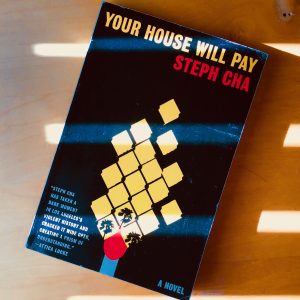 On March 16, 1991, 16-year-old Ava Matthews walked into a Korean-owned convenience store in South Central Los Angeles to buy milk.
On March 16, 1991, 16-year-old Ava Matthews walked into a Korean-owned convenience store in South Central Los Angeles to buy milk.
A scuffle ensued when the owner thought Ava was stealing, and Ava ended up shot in the back of the head, bleeding out on the floor with two dollars in her hand. Her younger brother, Shawn, witnessed the entire incident, which was caught on tape, but the owner/shooter received only probation and no jail time.
In 2019, 27-year-old Grace Park is still living at home with her parents and working in the pharmacy they own. She’s the dutiful daughter, while her older sister is estranged from their parents for reasons unknown to Grace. One day something catastrophic happens, forcing Grace to reckon with the terrible secrets her family has kept from her.
Steph Cha’s Your House Will Pay is based on the true story of Latasha Harlins, a teen shot dead in 1991 in a Korean-owned store. The fallout is believed by historians and Angelenos to have helped spark the L.A. riots the following year.
In chapters alternating between 1991 and 2019—and between Shawn’s and Grace’s perspectives—Cha peels back the layers of incendiary race relations in a city with people who can suffer only so much injustice. The Matthews and Park families, on opposite sides of the central conflict, are both depicted with deep insight and empathy—and their flaws intact.
There are no villains or heroes, only humans whose paths collided one tragic day and are still paying for the damage done. The ending is a bit abrupt, but it offers hope that healing and forgiveness can begin.
This review originally appeared in Shelf Awareness for Readers and is reprinted here with permission.
]]>
Hello, my 3 faithful PCN readers!
These past few weeks have been a whirlwind of creativity. I shot a TV show and am preparing to shoot a movie and do some voice work. Some of the projects will premiere later this year or next year, but one is available now.
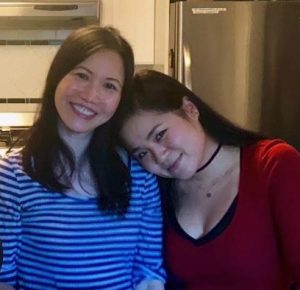 A year ago I had a blast working with Kelly Marie Tran (The Last Jedi) on a fictional mystery podcast called Passenger List. It’s about a plane that goes missing, and Kelly plays a young woman digging for answers because her twin brother was on the flight.
A year ago I had a blast working with Kelly Marie Tran (The Last Jedi) on a fictional mystery podcast called Passenger List. It’s about a plane that goes missing, and Kelly plays a young woman digging for answers because her twin brother was on the flight.
There are 8 episodes and 5 are available now, with a new one released every Monday until October 28. They’re available at Passengerlist.org and podcast platforms everywhere. Oh, and they’re free! (There are ads.) I’m part of a few episodes and guest stars like Patti LuPone also pop up. Let me know your thoughts if you listen!
Running off to practice some stunts and my violin now. Have a great weekend!
]]>Her debut, The Kiss Quotient, was a breakout hit in 2018 and acquired by Pilgrim Media Group for a movie adaptation. Kiss features a brilliant female lead with autism—which Hoang also has—and a sexy half-Vietnamese man as the love interest.
Read on for my review of Hoang’s follow-up, The Bride Test, and my chat with her. (Both originally ran in Shelf Awareness for Readers and are republished here with permission.)
Review: The Bride Test
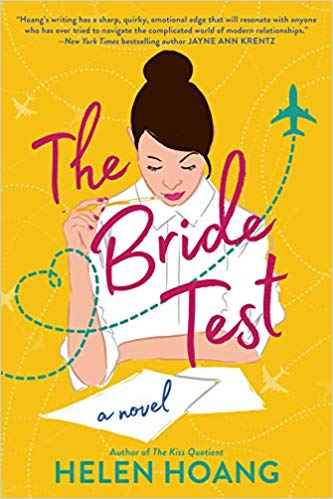 Khai Diep is certain he has a stone heart, one that can’t feel love or sadness. During his cousin Andy’s funeral, Khai remains dry-eyed. It doesn’t bother him too much, though. Isn’t it a good thing grief can’t touch him? Who wants to wail like his aunties? Besides, he likes being alone with his routines, not dealing with messy emotions.
Khai Diep is certain he has a stone heart, one that can’t feel love or sadness. During his cousin Andy’s funeral, Khai remains dry-eyed. It doesn’t bother him too much, though. Isn’t it a good thing grief can’t touch him? Who wants to wail like his aunties? Besides, he likes being alone with his routines, not dealing with messy emotions.
But his mother has other ideas. She knows Khai processes emotions and social cues differently because he has autism. She goes to Vietnam to choose him a bride and meets My, a feisty young single mother who cleans hotel bathrooms. Khai’s mother gives My a startling offer: she’ll pay for My to spend the summer with Khai in California and get him to marry her. Other than the possibility of a better life for her and her young daughter, My has another reason for accepting the offer: she wants to find her American father, whom she’s never known.
My renames herself Esmeralda, and her plan to win over Khai leads to unexpected discoveries about herself and what she wants from life.
Helen Hoang’s The Bride Test is even more affecting than her breakout hit, The Kiss Quotient. With heart and humor, she humanizes people who are routinely marginalized, and Esme especially is someone to root for–a woman born into poverty who knows her value even when the world looks down on her. By the time Hoang says in the author’s note that Esme is based on the author’s own mother, a war refugee who became a successful businesswoman, readers might find their eyes aren’t dry at all.
Helen Hoang: Writing from the Heart
Helen Hoang lives in San Diego, Calif., with her husband and two children. In her author’s note in The Bride Test, Hoang mentions that her heroine is inspired by Hoang’s mother, a former Vietnamese refugee and successful businesswoman who passed away recently.
Did your mother read The Bride Test? How would she feel about Co Nga arranging a mail-order bride for her son?
No, my mom never read the book. But my aunt tried to arrange a wife for my cousin in much the same manner [as in the book], and my mom was aware of that. She didn’t seem to think the idea was that outrageous, though she was never very meddling with my siblings and me.
Why does Co Nga choose a woman from Vietnam, instead of from the local Vietnamese American community?
When my aunt tried to arrange a marriage for my cousin, she spoke to women in Vietnam because the Vietnamese American women she knew were either uninterested in her son or not up to her standards in terms of Vietnamese traditions and values.
What were some of those standards? And what was the result of her matchmaking attempt?
My aunt was unsuccessful. Her son refused to meet any of the girls she liked from Vietnam and eventually married a Filipino American woman. I believe my aunt wanted him to marry a woman who spoke Vietnamese and would be a homemaker, practice Buddhism, give her grandbabies and take care of her in her old age.
Your author’s note says you interviewed your mother for this book, about her experiences growing up poor and as a refugee. What was the biggest revelation for you during these discussions?
Growing up, I often thought my mom worked not only by necessity, but by preference. In other words, she was a workaholic, and sometimes I was resentful of this when I was a kid. Through these conversations with my mom, I came to understand why she was compelled to work so much and I could better empathize with her. Not only was she providing for her family and achieving financial security, but she was earning her own sense of worth. That was a heartbreaking realization for me–that her sense of self-worth was dependent on how much money she made.
How has writing about people with autism helped you in your daily life?
Writing these books has helped me process and understand my own autism so I can better communicate my needs with the people in my life and advocate for myself. For example, as I wrote The Bride Test, I finally understood why I bring books to wedding receptions. These events are truly overwhelming to me and because I’m physically trapped there, I read in an attempt to escape into myself. Now, instead of bringing a book to a wedding, I can leave early and it’s okay. People don’t get angry.
Your voice, and those of your protagonists, are specific and distinctive. What have readers told you they’ve learned the most from your characters and stories?
From what I’ve heard, it is eye-opening to read from the perspective of an autistic and/or Asian/Asian American character.
Regarding the autistic perspective, readers have appreciated learning about the specific challenges facing autistic people, but they’ve also remarked that they were happy to see that people of different neurotypes still have the same basic emotional needs and insecurities as most everyone else.
Khai’s brother, Quan, has made memorable appearances in The Kiss Quotient and The Bride Test, and steps onto center stage in your next book. Anything juicy you can tell us about it?
I’ve been conceptualizing Quan’s book as a gender-swapped Sabrina, where instead of the chauffeur’s daughter and the two rich brothers, we have the chef’s son and the two rich sisters.
You write about people who rarely get to be the center of Westernized stories. The couple in The Kiss Quotient include a half-Vietnamese man (who’s hot, not nerdy!), while both leads in The Bride Test are of Vietnamese descent, though one is half Vietnamese. Any plans for a story with both leads being 100% Vietnamese?
For Quan’s book, his love interest is Chinese American, and my next contracted books after this feature Michael’s sisters from The Kiss Quotient, who are all half Vietnamese. I don’t have specific plans to write a story with both leads being 100% Vietnamese, but I’m certainly not ruling it out.
Follow PCN on Instagram, Twitter, and Facebook.
PCN is an Amazon affiliate and might receive a small commission if a purchase is made via the buy link.
]]>